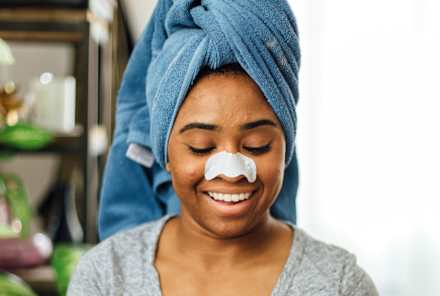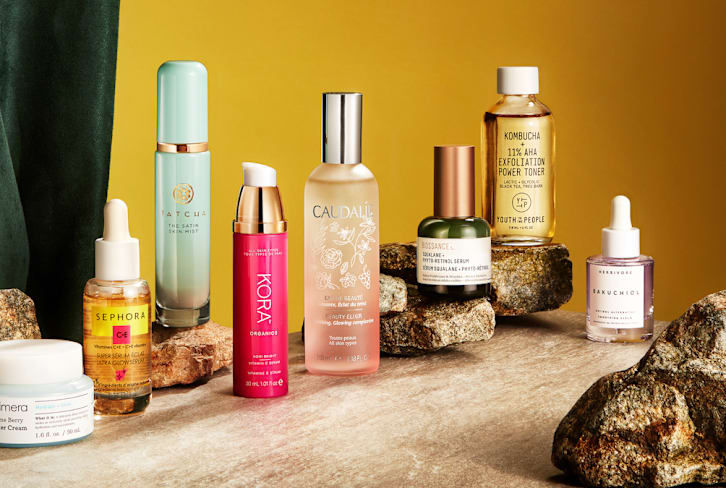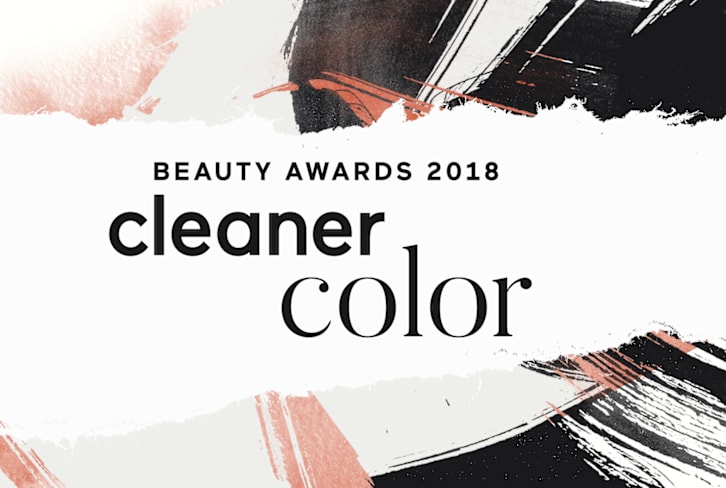Advertisement

Many people still don’t think of skin as an organ, but it is. Not only is it an organ, but it’s actually the largest organ in your body and the largest detox organ, as well. Translation: Our skin has a huge job to do, and its work is cut out for it.
This is important to consider when we’re talking about how to get clear skin. Caring about our skin can sometimes be construed as a vain pursuit. And, honestly, sometimes it is! No shame. But when patients come to me with a skin issue, I know that the skin is the body’s way of expressing what’s going on inside. Persistent acne, rashes, eczema, dermatitis, and more can be linked to some kind of inner imbalance.
Skin is tricky, though. You could be “doing everything perfectly”—eating the right foods, getting regular exercise, drinking tons of water, getting sleep, and staying on top your skin care game—and still deal with breakouts, rashes, and other issues. Many times, the skin is a barometer for stress, and can even signal emotional distress or some kind of misalignment with ourselves. Often, I’ve seen patients’ skin clear up after they address a root cause. Sometimes it’s a toxic relationship; other times it’s limiting beliefs, deep-seated family issues, the list goes on. But the common denominator is that the skin is one of the body’s ways to tell us when something’s up.
As such, we owe it to our skin to give it gentle, consistent, loving care. Skin is our barrier to the outside world, it’s responsible for protecting us against the elements while also functioning as the interchange between nutrients and toxins. It protects us from the sun and regulates our sense of touch and feel. It helps to keep us warm, cools us off, and it also knows when to let go of toxins and excess hormones through sweat.
Clear skin is much more than an end game—it’s a way to sync up with your body’s needs. Below are just a few elements that could be getting in the way of clear skin and how to address each. Of course, don’t change your current routine without talking to your doctor to see if it’s a fit for you.
Free radicals and the skin.
When you’re shopping for new skin care or even in a conversation with your dermatologist, you’ll hear the term “free radicals” come up. Free radicals are scavengers that cause damage to parts of cells, such as proteins and cell membranes, by a process called oxidation. The research shows that certain inputs—food, drink, and environmental related stimuli—are linked with an increase in free radicals in our bodies. Fried foods, alcohol, tobacco, sun exposure, smoking, and pollutants are the main culprits here. Reducing exposure to substances like these, which act as free radicals, is an important first step in protecting the skin. To make things more complicated, any kind of inflammation may also increase free radicals, which can attack the collagen matrix of skin, leading to changes in its appearance.
Fortunately, we can control some of this by reducing our exposure to anything associated with an increase in free radicals. Limiting direct sun exposure is one of the best ways to protect your skin and to keep it healthy. These are some of the best mineral based sunscreens that are on the natural side of the skin care spectrum, but covering up, staying out of the sun during peak hours, and reapplying sunscreen when you’re out are just as important. Curbing your booze intake (I know, not everyone’s favorite tip) cuts down on sugar and the dehydrating effects of alcohol, which can make a huge difference in the appearance of the skin.
Finally, starting to understand what foods your individual body is sensitive to is key. Avoiding sugar, trans fats, and fried foods is good for everybody, but if you’re sensitive to gluten, dairy, nuts, or any other foods, it’s best to avoid them as much as possible—while still living your life—for clear skin. (But again, it's a good idea to talk to your doctor first!)
Antioxidants and clear skin.
Alas, some damage is inevitable. I try to eat as well as possible and advise my clients to do the same—life needs to be lived. Sometimes you want that ice cream cone on a hot summer day; sometimes the celebratory glass of champagne (or three) is well-deserved. My motto is everything in moderation.
We can still take a proactive approach to repair the damage incurred and do our best to prevent further damage. For this, I recommend antioxidants and anti-inflammatory practices. Antioxidants1 help to prevent and repair free radical damage. Powerful antioxidants include green tea and vitamin A (more specifically, the carotenoids beta-carotene, lutein, and lycopene), which act as the repair crew for damage done to the skin. Green tea is a potent antioxidant with loads of studies extolling the benefits that it has on the skin, both internally and externally. The key component in green tea that provides its antioxidant kick is epigallocatechin-3 gallate (EGCG), which has been shown to inhibit oxidative stress.
If you can tolerate caffeine, adding green tea or matcha into your morning routine can be an excellent anti-inflammatory habit. Topical products that include green tea are available and, in studies using mice, have been shown to reduce tumor-related activity. From a diet standpoint, make sure to eat carrots and tomatoes, as they’re high in carotenoids and can help deliver antioxidants.
Collagen and clear skin.
As we age, skin will be exposed to various elements that challenge its integrity. Before we start the aging conversation, it’s important to clarify that aging is not inherently bad. In fact, I feel strongly that it’s important to embrace the natural signs of aging, especially as women, as they are often a sign of a life well-lived—laugh lines, silver streaks, and, yes, wrinkles. We should be celebrating them! That said, there are steps we can take to support our skin and make sure it’s aging healthfully.
One of the best things you can do to support your skin is to make sure you’re consuming some type of collagen. Collagen is essentially our skin’s support system. These days, it’s the sought-after nutrient associated with glowing, youthful, vibrant skin. On a molecular level, collagen is an amino acid that forms connective fibers, which are necessary for maintaining the strength and structure of skin cells. Fun fact: Collagen is the most abundant protein in the human body.
Collagen does more than just help the appearance of your skin—it can also help you repair and maintain a healthy gut. Many argue that maintaining a healthy gut environment is important in managing inflammation levels in the skin. Taking action to balance gut bacteria includes eating foods high in probiotics and prebiotics. Beneficial bacteria in our diets from foods such as kimchee and kombucha (think fermented foods) help to balance “good” and “bad” bacteria levels, which helps with digestion, brain fog, nutrient absorption, and immunity. Drinking bone broth is a great source of collagen in our diet.
Hydration and clear skin.
Fact: Skin cells are made of mostly water, so staying hydrated is at the top of the list for healthy, glowing skin. I know—you’re probably sick of hearing the “drink tons of water” tip, but it’s worth a reminder because it’s so easy to do (and equally easy to forget). Drinking at least two liters of water each day will help keep your body processes, including detox processes like sweating and eliminating, humming. Supporting your natural detox processes are a huge piece of the healthy skin puzzle.
If you’re drinking your water and still find that your skin is dry, you might try a product that includes hyaluronic acid like Dr. Sturm’s hyaluronic acid serum, Monestery Made’s hyaluronic aloe gel, or a more budget-friendly option like Insta Natural’s hyaluronic acid. Hyaluronic acid has a unique capacity2 to retain water in the skin, which degrades as we get older, so targeting it topically may help keep skin hydrated in the short term.
Vitamin C is another topical that’s been shown to help protect the skin from sun damage. Integrative dermatologist Cybele Fishman, M.D. recommends SkinCeuticals CE Ferulic serum for her patients, and Odacite’s “C for Colette” Vitamin C + Superfood oil is a more natural version of that. Powder vitamin C treatments are trending, too—True Botanicals’ Vitamin C Booster and the Nue Co.’s vitamin C “topical C” product are meant to be mixed into your water-based serums (scan the ingredients for water, making sure the product is not just oil) for a more potent effect. The logic is that vitamin C degrades over time, losing its potency in a bottle, but does not in powder form. The more you know.
Another way to hydrate your skin is to start consuming more vitamin E. Vitamin E is a critical component of the barrier function of our skin, made up of a layer of healthy lipids (fats). Getting adequate vitamin E through foods like almonds and supplements helps to support and protect our skin from oxidative stress and UV damage.
Finally, if you suspect your diet may be lacking in foods that support clear skin, you may want to consider supplements and multivitamins that support healthy skin.
Natural skin care and clear skin.
It’s true, some people are genetically gifted and can have great skin with minimal self-care. For the rest of us, finding a skin care routine that works can be as important as eating a healthy diet and regular movement.
Many people find success in switching to an all-natural routine. However, there’s a common misconception that natural products are also gentle. The reality is that some are, some aren’t. With the rise of the natural skincare industry especially in the last two years, we have more options than ever before, which is great! But make sure to do your diligence. Even botanical ingredients can be powerful and irritating in small amounts.
A new category of skin care has emerged that mindbodygreen has dubbed “healthy hybrids,” while other brands call it “clean clinical,” or “safe synthetics.” They combine the best of synethic ingredients that have shown to minimize skin irritation with all-star natural products, making products that are generally better for people with sensitive skin. Check out Drunk Elephant, Susanne Kaufmann, and Biossance to see examples.
Of course, skincare can’t replace your lifestyle—so unless you’re genetically gifted with incredible skin (lucky you), constant stress, missing sleep, drinking alcohol, and eating a sub par diet will still contribute to skin issues.
Watch Next
Enjoy some of our favorite clips from classes
Enjoy some of our favorite clips from classes
What Is Meditation?
Mindfulness/Spirituality | Light Watkins
Box Breathing
Mindfulness/Spirituality | Gwen Dittmar
What Breathwork Can Address
Mindfulness/Spirituality | Gwen Dittmar
The 8 Limbs of Yoga - What is Asana?
Yoga | Caley Alyssa
Two Standing Postures to Open Up Tight Hips
Yoga | Caley Alyssa
How Plants Can Optimize Athletic Performance
Nutrition | Rich Roll
What to Eat Before a Workout
Nutrition | Rich Roll
How Ayurveda Helps Us Navigate Modern Life
Nutrition | Sahara Rose
Messages About Love & Relationships
Love & Relationships | Esther Perel
Love Languages
Love & Relationships | Esther Perel


















